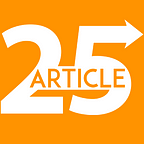Mark Amunga:
Transform Your Health Rights
My journey with Article 25 started immediately after my internship with the Western Organization for People with HIV/AIDS (WOPLAH/Ambassadors of Hope) in western Kenya, where I was introduced to Article 25 and the right to health. Following this introduction by my supervisor from WOPLAH, Mr. Edwin Wetoyi, I was humbled to volunteer to raise awareness among people about health rights. This led me to the Article 25 Global Vote.
I fully decided to participate after noticing that my family, my friends, my community and I were on the frontlines of vulnerability due to health inequity.
The Global Vote means a lot to my community. First, it is a form of breaking all barriers — both economical and political — among the few ethnic groups in power who have been keeping people of low status from realizing their dreams of accessing quality health services. The Global Vote is a way to bring marginalized people out of the darkness of corruption, poverty, oppression, discrimination, and iniquitous health rights towards global equity in health services.
It has been easier said than done for the deprived to make or engage in decisions that pertain to their own health issues, despite having freedom of expression. But with the Global Vote, we believe the power to make those choices is in our hands.
Some of the issues important to me on the Global Vote ballot include:
—MAKING MEDICINES AFFORDABLE BY IMPROVING DRUG DEVELOPMENT—
Pushing for renewed focus on neglected diseases like TB and rallying support for new drug development innovation that protects and prioritizes public health priorities.
For the poor, affording genuine and curative drugs is a thing of the past. There is a void in which corruption runs rampant and counterfeit drugs are being sold to poor communities. The Global Vote will come up with strategies that will help eradicate such false propaganda for the benefit of both the poor and the well off.
In addition, neglecting diseases like TB is a slow poison to the underprivileged who cannot afford treatment or medication. Voting to make medicines affordable by improving drug development will relieve the pain and suffering of infected and affected families.
—LACK OF MEDICAL SUPPLIES, MEDICINES, AND EQUIPMENT—
For global health equity to be stable and sustainable, medical supplies, medicines, and equipment must be given priority in 2015. It has been a trend in our local communities to look for medicines and other health services in private hospitals and clinics that are unsanitary, pricey, and deliver poor service. People only do this because the public hospitals, clinics and health centers lack sufficient medical supplies, medicines and equipment, resulting in the deaths of our families and friends.
—LACK OF ADEQUATE INVESTMENT IN PUBLIC HEALTH CARE—
Poor government investment in public healthcare causes huge and negative impacts on the health of people of low status. Prioritizing this issue in the Global Vote will ensure a healthy society free from diseases, stigma and discrimination attached to poor people and communities. Adequate government investment in public health care will not only improve the health sector, but also the economic sector, because the government will incur smaller losses for the treatment, management and control of frequent disease outbreaks.
To those who have not yet voted, I encourage you to take this step to transform your health rights. Don’t wait to be affected by dangerous health conditions because of ignorance. The Global Vote will help marginalized families and those who have been discriminated against to achieve quality, improved health services and health rights.
Don’t hesitate.
ONE VOTE can save millions of lives.
Participate in the 2015 Global Vote today: join25.org/vote
This article is written by Mark Amunga, a right to health advocate from Kenya. Edited by Sarah Jean Horwitz.
